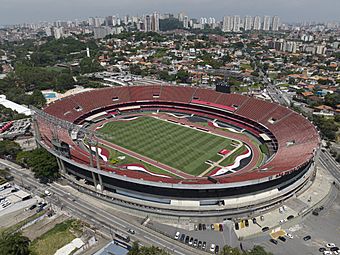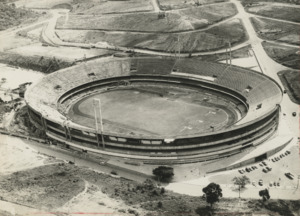Estádio do Morumbi facts for kids
|
Morumbi
|
|

Sisbrace
|
|
| Full name | Estádio Cícero Pompeu de Toledo |
|---|---|
| Location | Praca Roberto Gomes Pedrosa, 1, São Paulo, SP, Brazil |
| Public transit | |
| Owner | São Paulo FC |
| Operator | São Paulo FC |
| Capacity | (OFICIAL) 77,011 72,039 (international) (CBF)66,795 |
| Record attendance | 146,082 (Corinthians 1–2 Ponte Preta, 9 October 1977) |
| Field size | 105 x 68 m |
| Surface | Bermuda Celebration |
| Construction | |
| Broke ground | 15 August 1952 |
| Built | 17 September 1953 to 25 January 1970 |
| Opened | 2 October 1960 |
| Renovated | 1994−1996, 2000, 2009 and 2016 |
| Architect | João Batista Vilanova Artigas |
| Tenants | |
| São Paulo (1960–present) Brazil national football team (selected matches) |
|
The Estádio Cícero Pompeu de Toledo, often called Morumbi, is a famous football stadium. It is located in the Morumbi neighborhood of São Paulo, Brazil. This stadium is the home field for the São Paulo Futebol Clube.
Its official name honors Cícero Pompeu de Toledo. He was the club's chairman during most of the stadium's construction. Sadly, he passed away before it was finished. Morumbi is the biggest stadium in Brazil that is owned by a private club. The stadium was designed by a talented architect named João Batista Vilanova Artigas.
Contents
History of Morumbi Stadium
In its early days, the São Paulo Futebol Clube used a place called Chácara da Floresta. This was their main office and home field. It was near the Tietê river in central São Paulo. Because of this, the club's first version (from 1930 to 1935) was known as "São Paulo da Floresta."
When the club was restarted in 1935, they no longer owned Chácara da Floresta. So, they did not have their own field. From 1936, they rented the Antônio Alonso stadium. In 1938, São Paulo bought the Antônio Alonso stadium. When the Estádio do Pacaembu opened in 1940, São Paulo started using it. The Antônio Alonso stadium was sold in 1942.
In 1944, São Paulo bought land called Canindé. This area was used for their headquarters and training. But it was too small to build a large stadium. So, they looked for a better place in São Paulo.
In 1952, Cícero Pompeu de Toledo, São Paulo's chairman, asked the city for land. He wanted a plot in the Ibirapuera area. The mayor said no, but gave them land in the Morumbi neighborhood instead.
Building the Stadium
On August 15, 1952, the land for Morumbi was blessed. Then, the first steps for construction began. A special committee was chosen to manage the building project. Cícero Pompeu de Toledo was the president of this committee.
Money from selling the Canindé land (sold in 1956) helped pay for building materials. All the club's income was also used for the stadium. This meant the football team itself got less money. The actual building of the new stadium started in 1953. The design for Morumbi was created by architect João Batista Villanova Artigas. He was a key figure in modern architecture.
On August 15, 1952, the stadium construction started. Eight years later, in 1960, part of the stadium was ready. It was opened with space for 70,000 people.
The very first game was played on October 2, 1960. São Paulo beat Sporting Clube de Portugal 1-0. São Paulo's player, Peixinho, scored the first goal in the stadium.
In 1970, the stadium was finally finished. Its maximum capacity grew to 140,000 people. The re-opening game was between São Paulo and Porto, ending in a 1-1 tie.
The stadium's biggest crowd was 138,032 people in 1977. This was when Ponte Preta lost to Corinthians 2-1.
World Cup Consideration
Morumbi was considered for the opening game of the 2014 FIFA World Cup. However, in 2010, it was decided the stadium would not host games. This was because the club could not guarantee money for the needed upgrades. Later, a new stadium for Corinthians was chosen to host the World Cup matches in São Paulo. Morumbi was still modernized by the end of 2014.
Morumbi also hosted the first match of the 2019 Copa America.
Stadium Capacity
The Morumbi stadium once had space for 150,000 people. Now, its official maximum capacity is 77,011 seats. Due to safety concerns, the Brazilian Football Confederation (CBF) lowered the capacity. First, it went down to 72,039, and then to 66,795 seats. The playing field is 105 meters long and 68 meters wide.
Important Matches
2019 Copa América
| Date | Time (UTC-03) | Team #1 | Res. | Team #2 | Round | Attendance |
|---|---|---|---|---|---|---|
| 14 June 2019 | 21:30 | 3–0 | Group A | 47,260 | ||
| 17 June 2019 | 20:00 | 0–4 | Group C | 23,253 | ||
| 19 June 2019 | 18:30 | 1–0 | Group B | 22,079 |
Concerts and Events
Morumbi is one of the top places in Brazil for big concerts. It is often chosen along with the Estádio do Maracanã in Rio. The stadium can hold from 20,000 to 75,000 people for live music shows.
The British band Coldplay holds a record here. In 2023, they performed 6 shows during one tour. This was part of their Music of the Spheres World Tour. They also had the highest total attendance at the stadium, with 439,651 fans. Their concerts also set a record for the highest earnings in Brazil's history, making $40.1 million.
| Band/artist | Tour | Opening act | Year | Date | Attendance |
|---|---|---|---|---|---|
| Queen | The Game Tour | 1981 | March 20 and 21 | 251,000 | |
| Kiss | Creatures of the Night Tour 1982–1983 | 1983 | June 25 | 65,000 | |
| Menudo | Menudo | 1986 | March 16 | N/A | |
| New Edition | Heartbreak Tour | Al B. Sure! | 1988 | October 6–8 | N/A |
| Bob Dylan | Never Ending Tour 1990 | 1990 | January 18 | N/A | |
| Red Hot Chili Peppers | Blood Sugar ... Magik Tour | 1993 | January 15 | N/A | |
| Nirvana | Hollywood Rock Festival | 1993 | January 16 | 110,000 | |
| Michael Jackson | Dangerous World Tour | 1993 | October 15 and 17 | 250,000 | |
| Madonna | The Girlie Show World Tour | 1993 | November 3 | 86,000 | |
| Aerosmith | Get a Grip Tour | 1994 | January 14 | N/A | |
| Whitney Houston | The Bodyguard World Tour | 1994 | January 16 and 18 | N/A | |
| U2 | Popmart Tour | Bootnafat, Gabriel o Pensador | 1998 | January 30 and 31 | 154,056 |
| The Three Tenors | World Tour | 2000 | July 22 | N/A | |
| Backstreet Boys | Black & Blue Tour | 2001 | May 5 | N/A | |
| Rush | Vapor Trails Tour | 2002 | November 22 | 62,000 | |
| Linkin Park | Meteora World Tour | 2004 | September 11 | N/A | |
| U2 | Vertigo Tour | Franz Ferdinand | 2006 | February 20 and 21 | 149,700 |
| RBD | Tour Generación RBD | Diego González | 2006 | October 7 | 49,655 |
| Roger Waters | The Dark Side of the Moon Live | 2007 | March 24 | N/A | |
| Aerosmith | Aerosmith World Tour 2007 | 2007 | April 12 | N/A | |
| High School Musical | High School Musical: The Concert | 2007 | May 20 | 37,406 | |
| Madonna | Sticky & Sweet Tour | Paul Oakenfold | 2008 | December 18, 20 and 21 | 196,656 |
| Jonas Brothers | Jonas Brothers World Tour 2009 | Demi Lovato and Cine | 2009 | May 24 | N/A |
| AC/DC | Black Ice Tour | Nasi | 2009 | November 27 | 65,311 |
| Metallica | World Magnetic Tour | Sepultura | 2010 | January 30 and 31 | 84,435 |
| Beyoncé | I Am... World Tour | Ivete Sangalo | 2010 | February 6 | 52,757 |
| Coldplay | Viva La Vida Tour | Vanguart | 2010 | March 2 | 53,060 |
| Bon Jovi | The Circle Tour | Fresno | 2010 | October 6 | 55,833 |
| Rush | Time Machine Tour | 2010 | October 8 | 32,000 | |
| The Black Eyed Peas | The E.N.D World Tour | David Guetta | 2010 | November 4 | 56,329 |
| Paul McCartney | Up and Coming Tour | 2010 | November 21 and 22 | N/A | |
| Shakira | The Sun Comes Out World Tour | 2011 | March 19 | 45,417 | |
| Iron Maiden | The Final Frontier World Tour | Cavalera Conspiracy | 2011 | March 26 | 44,010 |
| U2 | U2 360° Tour | Muse | 2011 | April 9, 10, and 13 | 269,491 |
| Justin Bieber | My World Tour | 2011 | October 8 and 9 | 71,683 | |
| Eric Clapton | South American Tour | 2011 | October 12 | N/A | |
| Pearl Jam | Pearl Jam Twenty Tour | X | 2011 | November 3 and 4 | N/A |
| Roger Waters | The Wall Live | 2012 | April 1 and 3 | 99,869 | |
| Lady Gaga | Born This Way Ball Tour | The Darkness and Lady Starlight | 2012 | November 11 | 43,137 |
| Madonna | MDNA Tour | Gui Boratto | 2012 | December 4 and 5 | 85,255 |
| Beyoncé | The Mrs. Carter Show World Tour | 2013 | September 15 | 37,346 | |
| Bon Jovi | Because We Can: The Tour | Nickelback | 2013 | September 21 | 63,198 |
| Metallica | Metallica By Request | 2014 | March 22 | 61,742 | |
| One Direction | Where We Are Tour (One Direction) | P9 | 2014 | May 10 and 11 | N/A |
| Foo Fighters | Sonic Highways World Tour | Raimundos and Kaiser Chiefs | 2015 | January 23 | 66,958 |
| Pearl Jam | Latin America Tour | 2015 | November 14 | N/A | |
| The Rolling Stones | América Latina Olé Tour | Titãs | 2016 | February 24 and 27 | 135,656 |
| Black Sabbath | The End Tour | Rival Sons | 2016 | December 4 | 64,744 |
| U2 | The Joshua Tree Tour 2017 | Noel Gallagher's High Flying Birds | 2017 | October 19, 21, 22 and 25 | 278,718 |
| Bruno Mars | 24K Magic World Tour | DNCE | 2017 | November 22 and 23 | 83,437 |
| Iron Maiden | Legacy of the Beast Tour | The Raven Age | 2019 | October 6 | 56,247 |
| Metallica | Greta Van Fleet | 2022 | May 10 | 70,542 | |
| Coldplay | Music of the Spheres World Tour | CHVRCHES and Elana Dara | 2023 | March 10, 11, 13, 14, 17 and 18 | 439,651 |
| RBD | Soy Rebelde Tour | 2023 | November 12 and 13 |
See also
 In Spanish: Estadio Morumbi para niños
In Spanish: Estadio Morumbi para niños
 | Madam C. J. Walker |
 | Janet Emerson Bashen |
 | Annie Turnbo Malone |
 | Maggie L. Walker |



